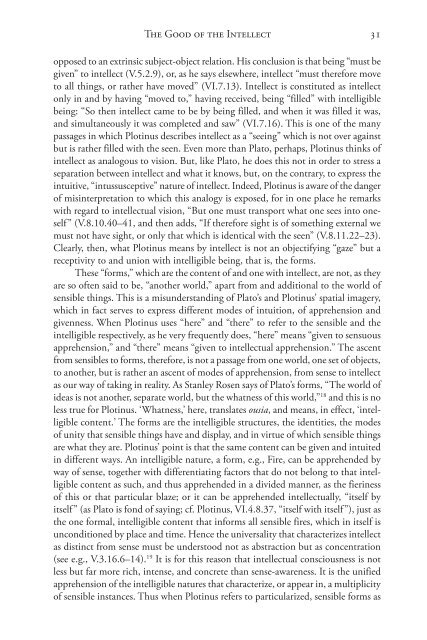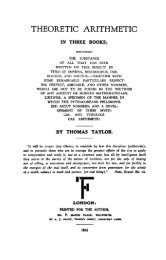Perl - The Good of the Intellect.pdf - Platonic Philosophy
Perl - The Good of the Intellect.pdf - Platonic Philosophy
Perl - The Good of the Intellect.pdf - Platonic Philosophy
You also want an ePaper? Increase the reach of your titles
YUMPU automatically turns print PDFs into web optimized ePapers that Google loves.
<strong>The</strong> <strong>Good</strong> <strong>of</strong> <strong>the</strong> <strong>Intellect</strong> 31<br />
opposed to an extrinsic subject-object relation. His conclusion is that being “must be<br />
given” to intellect (V.5.2.9), or, as he says elsewhere, intellect “must <strong>the</strong>refore move<br />
to all things, or ra<strong>the</strong>r have moved” (VI.7.13). <strong>Intellect</strong> is constituted as intellect<br />
only in and by having “moved to,” having received, being “filled” with intelligible<br />
being: “So <strong>the</strong>n intellect came to be by being filled, and when it was filled it was,<br />
and simultaneously it was completed and saw” (VI.7.16). This is one <strong>of</strong> <strong>the</strong> many<br />
passages in which Plotinus describes intellect as a “seeing” which is not over against<br />
but is ra<strong>the</strong>r filled with <strong>the</strong> seen. Even more than Plato, perhaps, Plotinus thinks <strong>of</strong><br />
intellect as analogous to vision. But, like Plato, he does this not in order to stress a<br />
separation between intellect and what it knows, but, on <strong>the</strong> contrary, to express <strong>the</strong><br />
intuitive, “intussusceptive” nature <strong>of</strong> intellect. Indeed, Plotinus is aware <strong>of</strong> <strong>the</strong> danger<br />
<strong>of</strong> misinterpretation to which this analogy is exposed, for in one place he remarks<br />
with regard to intellectual vision, “But one must transport what one sees into oneself”<br />
(V.8.10.40–41, and <strong>the</strong>n adds, “If <strong>the</strong>refore sight is <strong>of</strong> something external we<br />
must not have sight, or only that which is identical with <strong>the</strong> seen” (V.8.11.22–23).<br />
Clearly, <strong>the</strong>n, what Plotinus means by intellect is not an objectifying “gaze” but a<br />
receptivity to and union with intelligible being, that is, <strong>the</strong> forms.<br />
<strong>The</strong>se “forms,” which are <strong>the</strong> content <strong>of</strong> and one with intellect, are not, as <strong>the</strong>y<br />
are so <strong>of</strong>ten said to be, “ano<strong>the</strong>r world,” apart from and additional to <strong>the</strong> world <strong>of</strong><br />
sensible things. This is a misunderstanding <strong>of</strong> Plato’s and Plotinus’ spatial imagery,<br />
which in fact serves to express different modes <strong>of</strong> intuition, <strong>of</strong> apprehension and<br />
givenness. When Plotinus uses “here” and “<strong>the</strong>re” to refer to <strong>the</strong> sensible and <strong>the</strong><br />
intelligible respectively, as he very frequently does, “here” means “given to sensuous<br />
apprehension,” and “<strong>the</strong>re” means “given to intellectual apprehension.” <strong>The</strong> ascent<br />
from sensibles to forms, <strong>the</strong>refore, is not a passage from one world, one set <strong>of</strong> objects,<br />
to ano<strong>the</strong>r, but is ra<strong>the</strong>r an ascent <strong>of</strong> modes <strong>of</strong> apprehension, from sense to intellect<br />
as our way <strong>of</strong> taking in reality. As Stanley Rosen says <strong>of</strong> Plato’s forms, “<strong>The</strong> world <strong>of</strong><br />
ideas is not ano<strong>the</strong>r, separate world, but <strong>the</strong> whatness <strong>of</strong> this world,” 18 and this is no<br />
less true for Plotinus. ‘Whatness,’ here, translates ousia, and means, in effect, ‘intelligible<br />
content.’ <strong>The</strong> forms are <strong>the</strong> intelligible structures, <strong>the</strong> identities, <strong>the</strong> modes<br />
<strong>of</strong> unity that sensible things have and display, and in virtue <strong>of</strong> which sensible things<br />
are what <strong>the</strong>y are. Plotinus’ point is that <strong>the</strong> same content can be given and intuited<br />
in different ways. An intelligible nature, a form, e.g., Fire, can be apprehended by<br />
way <strong>of</strong> sense, toge<strong>the</strong>r with differentiating factors that do not belong to that intelligible<br />
content as such, and thus apprehended in a divided manner, as <strong>the</strong> fieriness<br />
<strong>of</strong> this or that particular blaze; or it can be apprehended intellectually, “itself by<br />
itself” (as Plato is fond <strong>of</strong> saying; cf. Plotinus, VI.4.8.37, “itself with itself”), just as<br />
<strong>the</strong> one formal, intelligible content that informs all sensible fires, which in itself is<br />
unconditioned by place and time. Hence <strong>the</strong> universality that characterizes intellect<br />
as distinct from sense must be understood not as abstraction but as concentration<br />
(see e.g., V.3.16.6–14). 19 It is for this reason that intellectual consciousness is not<br />
less but far more rich, intense, and concrete than sense-awareness. It is <strong>the</strong> unified<br />
apprehension <strong>of</strong> <strong>the</strong> intelligible natures that characterize, or appear in, a multiplicity<br />
<strong>of</strong> sensible instances. Thus when Plotinus refers to particularized, sensible forms as
















